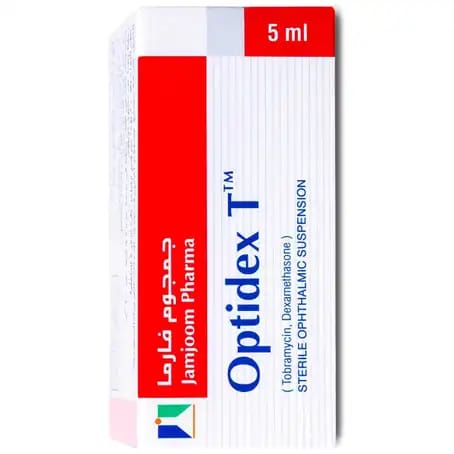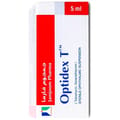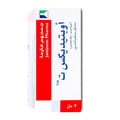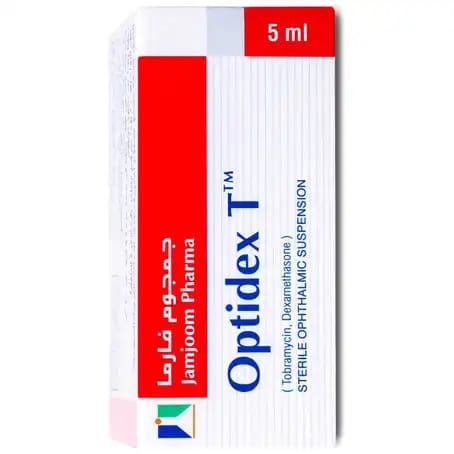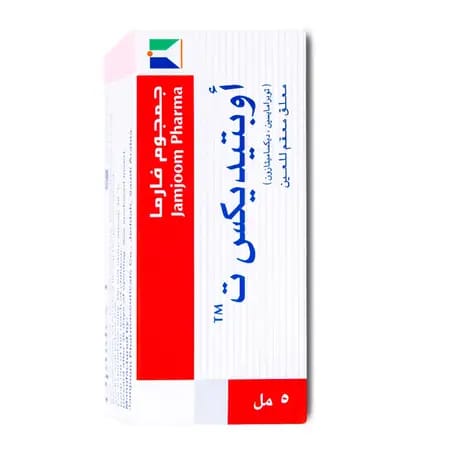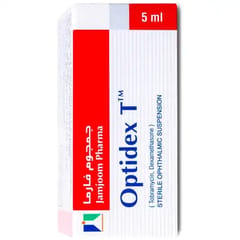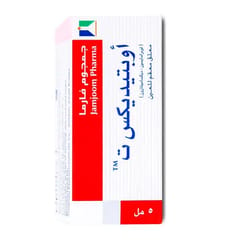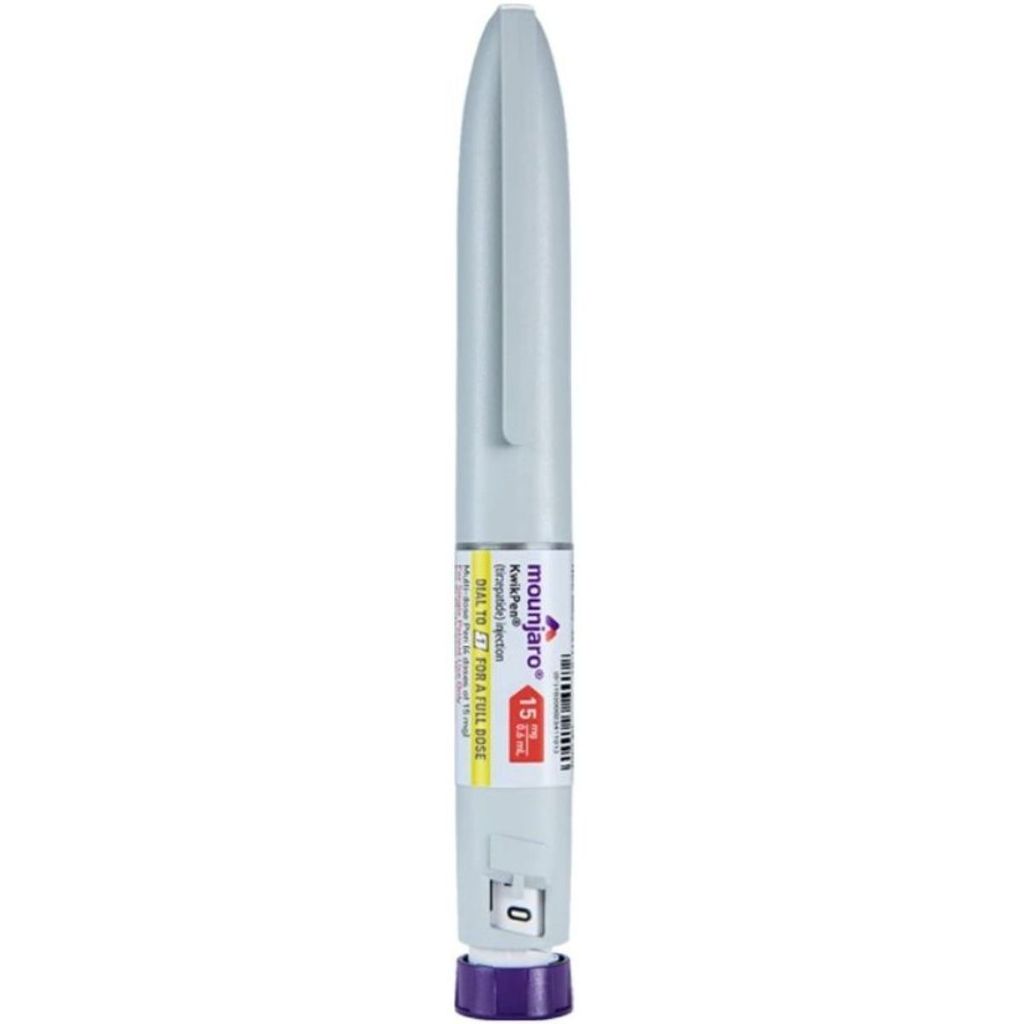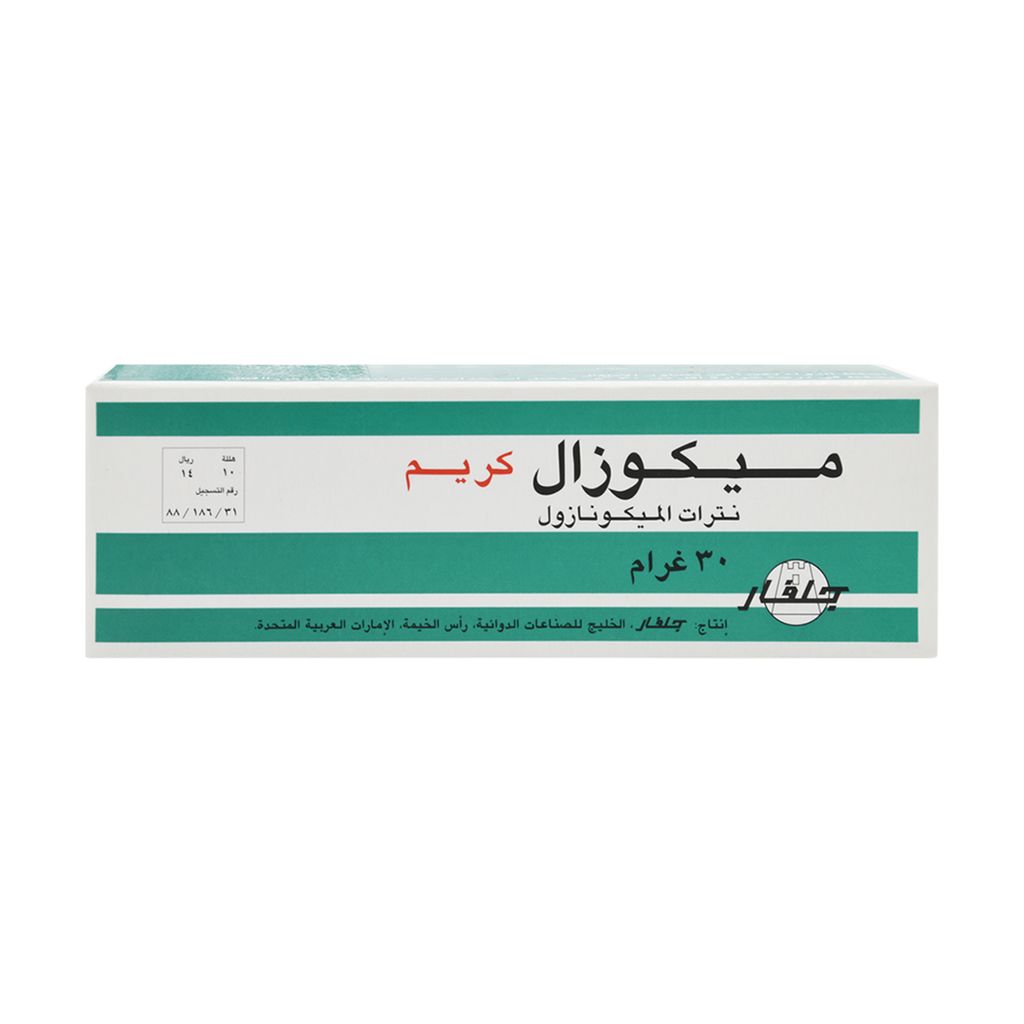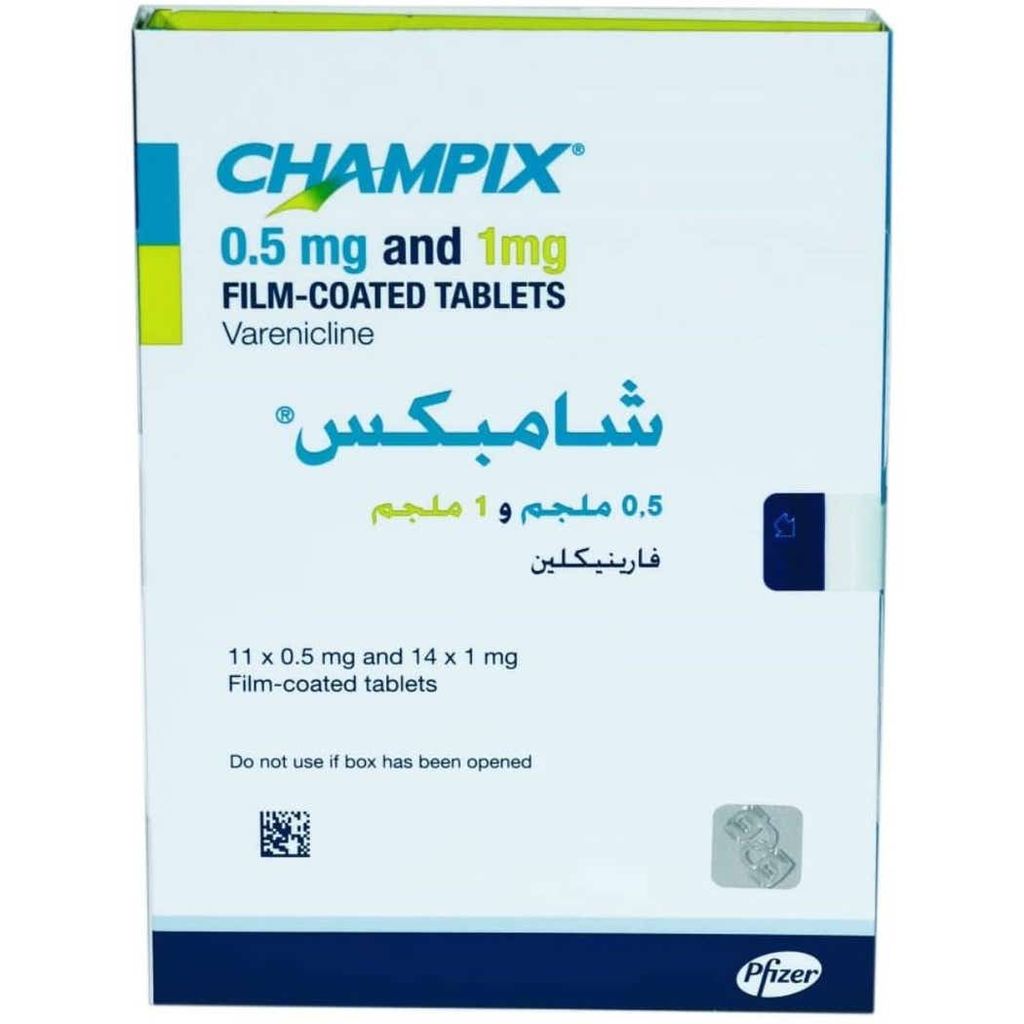One Square - Ar Rabi, 7773, 13315 Riyadh SA
Whites
One Square - Ar Rabi, 7773, Riyadh, SA
+966920006648 https://www.whites.net/s/5e5b8eb5e1a30016118f588f/62495a1e58355cabd8278173/app-icon-1024x1024px-480x480.png" [email protected] 5e9d4b55f8d104384674dd8f Optidex-T Eye Drop 5 ml https://www.whites.net/s/5e5b8eb5e1a30016118f588f/6562ff2e69134888cf8fd905/optidex-t-eye-drop-5-ml-00_1.jpg
Tobramycin 3mg/ml/ Dexamethasone 1mg/mlEye drops suspension
What Tobramycin/ Dexamethasone is used for:
- This product is used for the prevention of bacterial infections and to prevent/treat inflammation after cataract eye surgeries in adults and children above 2 years of age.
Do not use Tobramycin/ Dexamethasone:
- If you are allergic to Tobramycin, Dexamethasone or any of the ingredients in this medicine.
- Tell your doctor about the allergy and what signs you had.
- If you have or think that you have an eye infection. Use of corticosteroids on infected eyes may worsen the infection.
- If you are experiencing a sticky discharge from your eye.
- If you have a red eye that was not examined by your doctor.
Warnings and Precautions:
- Stop using this medicine and talk to your doctor if you develop allergic reactions such as shortness of breath, skin rash, swelling of the face or neck, decreased blood pressure and dizziness.
- Your doctor should start you on an appropriate therapy if this happens.
- Talk to your doctor before starting Tobramycin/ Dexamethasone if you wear soft contact lenses.
- This medicine is intended for topical eye use only and should not be used for injection into the eye.
- You may experience sensitivity to this medicine. If this happens, stop using it.
- Prolonged use of this medicine may cause an overgrowth of non-susceptible organisms, including fungi.
- In case of superinfection, your doctor should start you on an appropriate therapy.
- Prolonged use may also cause an increase in your intraocular (eye) pressure and/or cataract.
- Cross-sensitivity to other aminoglycoside antibiotics may happen (experiencing hypersensitivity reactions to other aminoglycoside antibiotics if you already have previously experienced similar reactions to an aminoglycoside antibiotic).
- Do not wear contact lenses if you have signs and symptoms of bacterial conjunctivitis (e.g. eyes discharge, red, swollen or itchy eyes).
- Talk to your doctor if your eye condition is getting worse or if you experience new symptoms. You may become more prone to having infections when using this medicine.
- Talk to your doctor before starting this medicine if you have a problem that may cause thinning of your eye tissues (e.g. rheumatoid arthritis, Fuch’s dystrophy or after a corneal transplant). The use of corticosteroids may increase the risk of eye tissues thinning which may lead to perforation and may also delay the recovery of your eye wound.
- Talk to your doctor before starting this medicine if you use topical nonsteroidal anti-inflammatory drugs (NSAIDs) which are used to reduce inflammation and pain. Concomitant use of topical NSAIDs with dexamethasone may further slow or delay recovery.
- Talk to your doctor before starting this medicine if you have diabetes (high blood glucose levels) as the risk of corticosteroid-induced increase in intraocular pressure may be higher if you have diabetes.
- Talk to your doctor if you experience blurred vision or other visual problems.
- Talk to your doctor if you are using other antibiotics, including oral antibiotics.
- Talk to your doctor if you currently have or if you have previously had medical problems that may cause muscle weakness like myasthenia gravis or Parkinson’s disease as the use of antibiotics of this type may worsen muscle weakness.
- Talk to your doctor if you experience Cushing’s syndrome signs which is a syndrome that is manifested by swelling and weight gain around the trunk and in the face.
- You may experience suppression of the adrenal gland (a gland on your kidneys) function after stopping a long-term or intensive treatment with this medicine. Do not stop taking this medicine without talking to your doctor first. The risk of adrenal gland suppression is higher in children and patients being treated with medicines known as ritonavir or cobicistat.
- Talk to your doctor if you experience signs and symptoms of adrenal suppression such as fatigue, muscle weakness, lightheadedness when standing, difficulty standing, weight loss, fever, anxiety, vomiting, nausea, headache, diarrhea, sweating, mood or personality changes, and joint or muscle aches.
- Your doctor should be monitoring your intraocular pressure frequently (especially in children under 6 years of age).
- The safety and efficacy of this medicine in children under 2 years of age has not been established and therefore is not recommended in this population.
- This product contains a preservative known as benzalkonium chloride which can affect the color your soft contact lenses and may also cause eye irritation especially if you have cornea problems or eye dryness, therefore make sure that you remove your soft contact lens before you apply the eye drop and wait at least 15 minutes before you put your contact lens back.
Possible side effects:
- Possible side effects include allergic reactions, increased eye pressure, eye irritation, eye itching. eye discomfort, eye pain, watery eyes, headache. runny nose, throat tightness, increase in pupil size, increased tear production, eyelid redness or swelling, dizziness,
- abdominal pain, nausea, increased blood pressure. growth of excess body hair (especially in women), changes in the levels of calcium and protein in your body,
- purple stretch marks on body skin. swelling and weight gain of the body and face, delayed growth in children and adolescents, irregular or missed periods, muscle weakness, infection and delayed wound healing if used for more than 24 days.
Other medicines and Tobramycin/ Dexamethasone:
- Tell your doctor or pharmacist if you are taking, have recently taken or might take any other medications including prescription medicines, over the counter medicines (non-prescription medicines), vitamins, supplements and eye drops.
- If you are using more than one eye drop solution, make sure to administer each at least five minutes apart to avoid precipitation of the eye drop. If you are using an eye ointment, make sure that you apply it last.
- If you are using topical NSAIDs.
- If you are using ritonavir or cobicistat (used in HIV treatment).
How to apply Tobramycin/ Dexamethasone:
- The usual recommended dose is 1 drop in the affected eye(s) every four to six hours (while you are awake).
- Your doctor may recommend a dose of 1 drop every two hours during the first 48 hours of treatment.
- Do not use this medicine for more than 24 days.
- The dose is the same for adults and children above 2 years of age.
How To Use:
- Use this medicine exactly as prescribed by your doctor. Ask your doctor if you are not sure.
- Wash your hands. When opening the bottle for the first time, tear off the plastic safety strip. Uncap the bottle. Shake the bottle well.
- Tilt your head slightly backward and pull down your lower eyelid making a pocket.
- Keep the bottle above your eye with the tip facing down. Look upward and away from the bottle then press on the container to release a drop (do not squeeze).
- Let go of the lower eyelid and close your eyes for 1 minute. If an eye drop is missed, repeat the steps.
- Wipe off any excess drops from your cheeks. Repeat the same steps after opening the bottle for the other eye if needed.
- Space your eye drops by at least 5 minutes.
- Use at the same time every day.
- Do not stop using your medication without consulting your doctor.
- Do not use the eye drop if the tamper-proof seal on the bottle neck is broken when you are using it for the first time.
- Avoid contact of the eye drop tip with your eye or other surfaces to prevent bacterial contamination which may lead to eye infection and serious eye damage.
- Contact your doctor if you suspect that your eye drop is contaminated.
How to store Tobramycin/ Dexamethasone:
- Discard the bottle 28 days after its opening even if it is not empty.
- Keep out of the reach of children and pets.
- Do not use beyond the expiry date mentioned on the box.
- Keep away from light.
- Keep the bottle tightly closed.
- Do not share your medicine with others.
- Do not dispose in the wastewater or household waste.
- Ask your pharmacist how to properly dispose medicines that you no longer use.
in stockSAR 19.95
OPTIDEX
Email ID already exists!
Your Current password is incorrect
Password Updated Successfully
Thanks for your Feedback
- Home
- Medications
- Medication
- Optidex-T Eye Drop 5 ml
Optidex-T Eye Drop 5 ml
 19.95
19.95This Product is only deliverable in Riyadh
Available
See all products of this brand to stay updated on exciting launches, new collections & more!
Tobramycin 3mg/ml/ Dexamethasone 1mg/mlEye drops suspension
What Tobramycin/ Dexamethasone is used for:
- This product is used for the prevention of bacterial infections and to prevent/treat inflammation after cataract eye surgeries in adults and children above 2 years of age.
Do not use Tobramycin/ Dexamethasone:
- If you are allergic to Tobramycin, Dexamethasone or any of the ingredients in this medicine.
- Tell your doctor about the allergy and what signs you had.
- If you have or think that you have an eye infection. Use of corticosteroids on infected eyes may worsen the infection.
- If you are experiencing a sticky discharge from your eye.
- If you have a red eye that was not examined by your doctor.
Warnings and Precautions:
- Stop using this medicine and talk to your doctor if you develop allergic reactions such as shortness of breath, skin rash, swelling of the face or neck, decreased blood pressure and dizziness.
- Your doctor should start you on an appropriate therapy if this happens.
- Talk to your doctor before starting Tobramycin/ Dexamethasone if you wear soft contact lenses.
- This medicine is intended for topical eye use only and should not be used for injection into the eye.
- You may experience sensitivity to this medicine. If this happens, stop using it.
- Prolonged use of this medicine may cause an overgrowth of non-susceptible organisms, including fungi.
- In case of superinfection, your doctor should start you on an appropriate therapy.
- Prolonged use may also cause an increase in your intraocular (eye) pressure and/or cataract.
- Cross-sensitivity to other aminoglycoside antibiotics may happen (experiencing hypersensitivity reactions to other aminoglycoside antibiotics if you already have previously experienced similar reactions to an aminoglycoside antibiotic).
- Do not wear contact lenses if you have signs and symptoms of bacterial conjunctivitis (e.g. eyes discharge, red, swollen or itchy eyes).
- Talk to your doctor if your eye condition is getting worse or if you experience new symptoms. You may become more prone to having infections when using this medicine.
- Talk to your doctor before starting this medicine if you have a problem that may cause thinning of your eye tissues (e.g. rheumatoid arthritis, Fuch’s dystrophy or after a corneal transplant). The use of corticosteroids may increase the risk of eye tissues thinning which may lead to perforation and may also delay the recovery of your eye wound.
- Talk to your doctor before starting this medicine if you use topical nonsteroidal anti-inflammatory drugs (NSAIDs) which are used to reduce inflammation and pain. Concomitant use of topical NSAIDs with dexamethasone may further slow or delay recovery.
- Talk to your doctor before starting this medicine if you have diabetes (high blood glucose levels) as the risk of corticosteroid-induced increase in intraocular pressure may be higher if you have diabetes.
- Talk to your doctor if you experience blurred vision or other visual problems.
- Talk to your doctor if you are using other antibiotics, including oral antibiotics.
- Talk to your doctor if you currently have or if you have previously had medical problems that may cause muscle weakness like myasthenia gravis or Parkinson’s disease as the use of antibiotics of this type may worsen muscle weakness.
- Talk to your doctor if you experience Cushing’s syndrome signs which is a syndrome that is manifested by swelling and weight gain around the trunk and in the face.
- You may experience suppression of the adrenal gland (a gland on your kidneys) function after stopping a long-term or intensive treatment with this medicine. Do not stop taking this medicine without talking to your doctor first. The risk of adrenal gland suppression is higher in children and patients being treated with medicines known as ritonavir or cobicistat.
- Talk to your doctor if you experience signs and symptoms of adrenal suppression such as fatigue, muscle weakness, lightheadedness when standing, difficulty standing, weight loss, fever, anxiety, vomiting, nausea, headache, diarrhea, sweating, mood or personality changes, and joint or muscle aches.
- Your doctor should be monitoring your intraocular pressure frequently (especially in children under 6 years of age).
- The safety and efficacy of this medicine in children under 2 years of age has not been established and therefore is not recommended in this population.
- This product contains a preservative known as benzalkonium chloride which can affect the color your soft contact lenses and may also cause eye irritation especially if you have cornea problems or eye dryness, therefore make sure that you remove your soft contact lens before you apply the eye drop and wait at least 15 minutes before you put your contact lens back.
Possible side effects:
- Possible side effects include allergic reactions, increased eye pressure, eye irritation, eye itching. eye discomfort, eye pain, watery eyes, headache. runny nose, throat tightness, increase in pupil size, increased tear production, eyelid redness or swelling, dizziness,
- abdominal pain, nausea, increased blood pressure. growth of excess body hair (especially in women), changes in the levels of calcium and protein in your body,
- purple stretch marks on body skin. swelling and weight gain of the body and face, delayed growth in children and adolescents, irregular or missed periods, muscle weakness, infection and delayed wound healing if used for more than 24 days.
Other medicines and Tobramycin/ Dexamethasone:
- Tell your doctor or pharmacist if you are taking, have recently taken or might take any other medications including prescription medicines, over the counter medicines (non-prescription medicines), vitamins, supplements and eye drops.
- If you are using more than one eye drop solution, make sure to administer each at least five minutes apart to avoid precipitation of the eye drop. If you are using an eye ointment, make sure that you apply it last.
- If you are using topical NSAIDs.
- If you are using ritonavir or cobicistat (used in HIV treatment).
How to apply Tobramycin/ Dexamethasone:
- The usual recommended dose is 1 drop in the affected eye(s) every four to six hours (while you are awake).
- Your doctor may recommend a dose of 1 drop every two hours during the first 48 hours of treatment.
- Do not use this medicine for more than 24 days.
- The dose is the same for adults and children above 2 years of age.
How To Use:
- Use this medicine exactly as prescribed by your doctor. Ask your doctor if you are not sure.
- Wash your hands. When opening the bottle for the first time, tear off the plastic safety strip. Uncap the bottle. Shake the bottle well.
- Tilt your head slightly backward and pull down your lower eyelid making a pocket.
- Keep the bottle above your eye with the tip facing down. Look upward and away from the bottle then press on the container to release a drop (do not squeeze).
- Let go of the lower eyelid and close your eyes for 1 minute. If an eye drop is missed, repeat the steps.
- Wipe off any excess drops from your cheeks. Repeat the same steps after opening the bottle for the other eye if needed.
- Space your eye drops by at least 5 minutes.
- Use at the same time every day.
- Do not stop using your medication without consulting your doctor.
- Do not use the eye drop if the tamper-proof seal on the bottle neck is broken when you are using it for the first time.
- Avoid contact of the eye drop tip with your eye or other surfaces to prevent bacterial contamination which may lead to eye infection and serious eye damage.
- Contact your doctor if you suspect that your eye drop is contaminated.
How to store Tobramycin/ Dexamethasone:
- Discard the bottle 28 days after its opening even if it is not empty.
- Keep out of the reach of children and pets.
- Do not use beyond the expiry date mentioned on the box.
- Keep away from light.
- Keep the bottle tightly closed.
- Do not share your medicine with others.
- Do not dispose in the wastewater or household waste.
- Ask your pharmacist how to properly dispose medicines that you no longer use.
Related products
يصرف بوصفه طبية
MOUNJARO
مونجارو كويك بن 15 مج قلم واحد
 1261.4 SAVE 0% SAVE
1261.4 SAVE 0% SAVE  0
0{"_id":"66d5a5c8c392a90032627d66","_metadata":{},"seller":"5e5ba36356297b5dd7d7df93","alias":"mounjaro-15-mg-0-6ml-kwikpen-4-doses","images":[{"image":"67078909ba30e10032711289/53204.jpg"}],"collections":["all-items-live-2024"],"categories":["prescribed-medicines","medicines","medication","medications","wellness"],"metafields":{"kunooz_label2_name":"يصرف بوصفه طبية","kunooz_label2_color":"#BF1717","whites_label2_name":"يصرف بوصفه طبية","whites_label2_color":"#DA198A","unitSAP":"EA","kunooz_product_type":[],"health_conditions":[],"frequently_bought":[],"use_it_with":[],"pick_your_free_items":[],"combo_offer":[],"kunooz_categories":["prescribed-medicines","medicines"],"whites_categories":["medication","medications","wellness"],"skin_tone":[],"lips":[],"kunooz_seo":{},"whites_seo":{},"benefits":"","ingredients":"","how_to_use":"","what_is":"","therapeutic_uses":"","dosage_and_administration":"","contraindication_and_drug_interaction":"","warning_and_precautions":"","side_effects":"","more_information":"","riyadh_only":1},"sku":"53204","name":"مونجارو كويك بن 15 مج قلم واحد","price":1261.4,"inventory_quantity":112,"available":true,"sort_order":0,"brand":"MOUNJARO","list_price":1261.4,"our_price":1261.4,"original_price":1261.4,"discounts_total":0,"discounts_percentage":"0.000","discount_total":0,"original_sort_order":0,"entity_type":"ms.products","selected_options":{},"selected_variant":{}}
MIKOZAL
ميكوزال كريم 30 جرام
 14.1 SAVE 0% SAVE
14.1 SAVE 0% SAVE  0
0{"_id":"5e9d4b8e837af137b82d82aa","name":"ميكوزال كريم 30 جرام","price":14.1,"brand":"MIKOZAL","sku":"4809","inventory_quantity":2,"seller":"5e5ba36356297b5dd7d7df93","available":true,"images":[{"image":"5e9d4b8e837af137b82d82aa/111771-0089.jpg","caption":"","tags":""},{"image":"5e9d4b8e837af137b82d82aa/111771-0089-2.jpg","caption":"","tags":""},{"image":"5e9d4b8e837af137b82d82aa/111771-0089-3.jpg","caption":"","tags":""}],"metafields":{"riyadh_only":1,"gtin_1":"6291100080526","kunooz_categories":["prescribed-medicine","pharmacy"],"whites_categories":[]},"alias":"mikozal-cream-30g","sort_order":1398,"_metadata":{},"collections":["shop-under-90-sar","below-sr-100","not-coupon-k25-items"],"categories":["pharmacy","medication","antibiotics-and-fungal"],"list_price":14.1,"our_price":14.1,"original_price":14.1,"discounts_total":0,"discounts_percentage":"0.000","discount_total":0,"original_sort_order":1398,"entity_type":"ms.products","selected_options":{},"selected_variant":{}}
CHAMPIX
شامبكس 0.5/1 25 قرص
 133.4 SAVE 0% SAVE
133.4 SAVE 0% SAVE  0
0{"_id":"5e9d4c574aff97384d3ea70f","name":"شامبكس 0.5/1 25 قرص","price":133.4,"brand":"CHAMPIX","sku":"12282","inventory_quantity":2,"seller":"5e5ba36356297b5dd7d7df93","available":true,"images":[{"image":"67c55bea8660000321580fd0/12282.jpg"},{"image":"67c55bea61b53803a4e738c7/12282-1.jpg"}],"metafields":{"riyadh_only":1,"gtin_1":"2280000017170","gtin_2":"5415062002629","kunooz_categories":["prescribed-medicine","pharmacy"],"whites_categories":[],"unitSAP":"EA","kunooz_product_type":[],"health_conditions":[],"frequently_bought":[],"use_it_with":[],"pick_your_free_items":[],"combo_offer":[],"skin_tone":[],"lips":[],"kunooz_seo":{},"whites_seo":{},"benefits":"","ingredients":"","how_to_use":"","what_is":"<p>ماهو؟</p>\n<p><span>يساعد دواء فارينيكلين مثل شامبكس المدخنين في الإقلاع عن التدخين.</span></p>\n<p></p>\n<p></p>\n<p><span>محتويات هذا الموقع هي لأغراض تثقيفية فقط وليست بديلة للإستشارة الطبية أو التشخيص أو العلاج. يرجى إستشارة طبيب أو مقدم رعاية صحية مؤهل ومراجعته بأي أسئلة قد تكون لديكم بخصوص اي حالة طبية. لا تتجاهل النصيحة الطبية المتخصصة أو تتأخر في طلبها بسبب شيء قرأته على هذا الموقع، لمزيد من التفاصيل حول معلومات المنتج يرجى الرجوع إلى النشرة المرفقة به.</span></p>","therapeutic_uses":"<p>ماهي دواعي الاستخدام؟</p>\n<p><span>يشار إلى الإقلاع عن التدخين لدى البالغين.</span></p>\n<p></p>\n<p></p>\n<p><span>محتويات هذا الموقع هي لأغراض تثقيفية فقط وليست بديلة للإستشارة الطبية أو التشخيص أو العلاج. يرجى إستشارة طبيب أو مقدم رعاية صحية مؤهل ومراجعته بأي أسئلة قد تكون لديكم بخصوص اي حالة طبية. لا تتجاهل النصيحة الطبية المتخصصة أو تتأخر في طلبها بسبب شيء قرأته على هذا الموقع، لمزيد من التفاصيل حول معلومات المنتج يرجى الرجوع إلى النشرة المرفقة به.</span></p>","dosage_and_administration":"<p><span>تناول هذا الدواء دائمًا كما أخبرك طبيبك.</span></p>\n<ul>\n<li><span>يأتي شامبيكس على شكل قرص أبيض (0.5 ملغ) وقرص أزرق فاتح (1 ملغ). تبدأ بالجهاز اللوحي الأبيض ثم تذهب عادةً للجهاز اللوحي باللون الأزرق الفاتح.</span></li>\n<li><span> انظر الرسم البياني أدناه للحصول على تعليمات الجرعات المعتادة التي يجب عليك اتباعها من اليوم الأول.</span></li>\n<li><span> جرعة الأسبوع الأول اليوم الأول - 3 من اليوم الأول إلى اليوم الثالث ، يجب تناول قرص أبيض مغلف CHAMPIX 0.5 ملغ مرة واحدة في اليوم. يوم 4-7 من اليوم الرابع إلى اليوم السابع ، يجب تناول قرص أبيض مغلف CHAMPIX 0.5 ملغ مرتين يوميًا ، مرة في الصباح ومرة في المساء ، في نفس الوقت تقريبًا كل يوم. الصفحة 3 من 10 الأسبوع 2 يوم 8-14 من اليوم الثامن إلى اليوم الرابع عشر ، يجب أن تتناول قرصًا واحدًا مغلفًا باللون الأزرق الفاتح CHAMPIX 1 mg مرتين يوميًا ، مرة في الصباح ومرة في المساء ، في نفس الوقت تقريبًا كل يوم. </span></li>\n<li><span> أسابيع 3 - 12 بعد 12 أسبوعًا من العلاج ، إذا توقفت عن التدخين ، فقد يوصي طبيبك بـ 12 أسبوعًا إضافيًا من العلاج باستخدام أقراص CHAMPIX 1 mg المغطاة بالفيلم مرتين يوميًا للمساعدة على تجنب العودة إلى التدخين. إذا لم تكن قادرًا أو راغبًا في الإقلاع عن التدخين على الفور ، يجب عليك تقليل التدخين خلال الأسابيع الـ 12 الأولى من العلاج والإقلاع عنه بنهاية فترة العلاج. يجب عليك بعد ذلك الاستمرار في تناول أقراص CHAMPIX 1 mg المغطاة بالفيلم مرتين يوميًا لمدة 12 أسبوعًا أخرى مما يؤدي إلى إجمالي 24 أسبوعًا من العلاج. إذا واجهت آثارًا سلبية لا يمكنك تحملها ، فقد يقرر طبيبك تقليل الجرعة مؤقتًا أو بشكل دائم إلى 0.5 مجم مرتين يوميًا. إذا كان لديك مشاكل في الكلى ، يجب عليك التحدث إلى طبيبك قبل تناول شامبيكس. قد تحتاج إلى جرعة أقل. Champix للاستخدام عن طريق الفم. يجب ابتلاع الأقراص كاملة مع الماء ويمكن تناولها مع أو بدون طعام. إذا كنت تأخذ CHAMPIX أكثر مما يجب إذا تناولت عن طريق الخطأ CHAMPIX أكثر مما وصفه طبيبك ، فيجب عليك طلب المشورة الطبية أو الذهاب إلى أقرب قسم إصابات في المستشفى على الفور. خذ علبة الأجهزة اللوحية معك. إذا نسيت تناول شامبكس لا تأخذ جرعة مضاعفة لتعويض القرص المنسي. من المهم أن تأخذ CHAMPIX بانتظام في نفس الوقت كل يوم. إذا نسيت أخذ جرعة ، خذها بمجرد أن تتذكرها. إذا ، في غضون 3-4 ساعات قبل الجرعة التالية ، لا تتناول الجهاز اللوحي الذي فاتك. إذا توقفت عن تناول شامبيكس لقد ثبت في التجارب السريرية أن تناول جميع جرعات الدواء في الأوقات المناسبة والمدة الموصى بها من العلاج الموصوف أعلاه سيزيد من فرص الإقلاع عن التدخين. لذلك ، ما لم يخبرك طبيبك بوقف العلاج ، من المهم الاستمرار في تناول شامبيكس ، وفقًا للتعليمات الموضحة في الجدول أعلاه. اليوم 15 - نهاية العلاج من اليوم 15 حتى نهاية العلاج ، يجب تناول قرص واحد أزرق فاتح مغلف CHAMPIX 1 mg مرتين في اليوم ، مرة في الصباح ومرة في المساء ، في نفس الوقت تقريبًا كل يوم.</span></li>\n</ul>\n<p><span></span></p>\n<p><span></span></p>\n<p><span>محتويات هذا الموقع هي لأغراض تثقيفية فقط وليست بديلة للإستشارة الطبية أو التشخيص أو العلاج. يرجى إستشارة طبيب أو مقدم رعاية صحية مؤهل ومراجعته بأي أسئلة قد تكون لديكم بخصوص اي حالة طبية. لا تتجاهل النصيحة الطبية المتخصصة أو تتأخر في طلبها بسبب شيء قرأته على هذا الموقع، لمزيد من التفاصيل حول معلومات المنتج يرجى الرجوع إلى النشرة المرفقة به.</span></p>","contraindication_and_drug_interaction":"<p><span>أخبر طبيبك عن جميع الأدوية التي تتناولها بما في ذلك الوصفات الطبية والأدوية التي لا تتطلب وصفة طبية والفيتامينات والمكملات العشبية. أخبر طبيبك بشكل خاص إذا</span></p>\n<ul>\n<li><span>أباكافير/ دولوتيغرافير (أدوية مضادة للفيروسات)، يمكن أن تؤدي هذه الأدوية إلى ارتفاع تركيز الفارنيكيلين. الكحول، يؤدي تناول فارنيكيلين إلى حدوث استجابات غير معروفة للكحول.</span></li>\n<li><span> الفصام. الاكتئاب. أفكار انتحارية. إدمان أو تسمم الكحول.</span></li>\n<li><span> الذبحات الصدرية والسكتات الدماغية. القصور الكلوي الحاد.</span></li>\n<li><span> الصرع. الحساسية تجاه دواء فارينيكلين. الحمل والإرضاع.</span></li>\n</ul>\n<p><span></span></p>\n<p><span>محتويات هذا الموقع هي لأغراض تثقيفية فقط وليست بديلة للإستشارة الطبية أو التشخيص أو العلاج. يرجى إستشارة طبيب أو مقدم رعاية صحية مؤهل ومراجعته بأي أسئلة قد تكون لديكم بخصوص اي حالة طبية. لا تتجاهل النصيحة الطبية المتخصصة أو تتأخر في طلبها بسبب شيء قرأته على هذا الموقع، لمزيد من التفاصيل حول معلومات المنتج يرجى الرجوع إلى النشرة المرفقة به.</span></p>","warning_and_precautions":"<p><span>تحدث إلى طبيبك قبل تناول هذا الدواء ، إذا</span></p>\n<ul>\n<li><span>أمراض الكلى. الاضطرابات العقلية/ اضطرابات المزاج (كالفصام، والاضطرابات ثنائية القطب، والاكتئاب).</span></li>\n<li><span> أمراض القلب والأوعية الدموية.</span></li>\n</ul>\n<p><span></span></p>\n<p><span>محتويات هذا الموقع هي لأغراض تثقيفية فقط وليست بديلة للإستشارة الطبية أو التشخيص أو العلاج. يرجى إستشارة طبيب أو مقدم رعاية صحية مؤهل ومراجعته بأي أسئلة قد تكون لديكم بخصوص اي حالة طبية. لا تتجاهل النصيحة الطبية المتخصصة أو تتأخر في طلبها بسبب شيء قرأته على هذا الموقع، لمزيد من التفاصيل حول معلومات المنتج يرجى الرجوع إلى النشرة المرفقة به.</span></p>","side_effects":"<p><span>مثل جميع الأدوية ، يمكن أن يسبب هذا الدواء آثارًا جانبية ، على الرغم من عدم حصول الجميع عليها.</span></p>\n<ul>\n<li><span>الغثيان أو التقيؤ. الصداع. النعاس.</span></li>\n<li><span> حدوث اضطرابات في النوم أو رؤية أحلام غريبة. الإمساك.</span></li>\n<li><span> تغير في حاسة الذوق.</span></li>\n</ul>\n<p><span></span></p>\n<p><span></span></p>\n<p><span>محتويات هذا الموقع هي لأغراض تثقيفية فقط وليست بديلة للإستشارة الطبية أو التشخيص أو العلاج. يرجى إستشارة طبيب أو مقدم رعاية صحية مؤهل ومراجعته بأي أسئلة قد تكون لديكم بخصوص اي حالة طبية. لا تتجاهل النصيحة الطبية المتخصصة أو تتأخر في طلبها بسبب شيء قرأته على هذا الموقع، لمزيد من التفاصيل حول معلومات المنتج يرجى الرجوع إلى النشرة المرفقة به.</span></p>","more_information":"<p><span>الحمل والرضاعة:</span></p>\n<p><span>إذا كنت حاملاً أو مرضعة ، فكري في أنك قد تكونين حاملاً أو تخططين لإنجاب طفل ، اسأل طبيبك أو الصيدلي للحصول على المشورة قبل تناول هذا الدواء. يفضل تجنب استخدام شامبيكس أثناء الحمل. تحدث إلى طبيبك إذا كنت تنوين الحمل. على الرغم من أنه لم يدرس ، قد ينتقل شامبيكس إلى حليب الثدي. يجب أن تطلب من طبيبك أو الصيدلي النصيحة قبل تناول شامبيكس.</span></p>\n<p><span> تخزين:</span></p>\n<p><span>يحفظ في درجة حرارة الغرفة</span></p>\n<p><span>محتويات هذا الموقع هي لأغراض تثقيفية فقط وليست بديلة للإستشارة الطبية أو التشخيص أو العلاج. يرجى إستشارة طبيب أو مقدم رعاية صحية مؤهل ومراجعته بأي أسئلة قد تكون لديكم بخصوص اي حالة طبية. لا تتجاهل النصيحة الطبية المتخصصة أو تتأخر في طلبها بسبب شيء قرأته على هذا الموقع، لمزيد من التفاصيل حول معلومات المنتج يرجى الرجوع إلى النشرة المرفقة به.</span></p>"},"alias":"champix-0-5-1-mg-tablet-25pcs","sort_order":0,"_metadata":{},"collections":["not-coupon-k25-items"],"categories":["pharmacy","medication","central-nervous-system"],"list_price":133.4,"our_price":133.4,"original_price":133.4,"discounts_total":0,"discounts_percentage":"0.000","discount_total":0,"original_sort_order":0,"entity_type":"ms.products","selected_options":{},"selected_variant":{}}
Ratings & Reviews
Your Bag 0 Items
